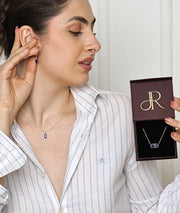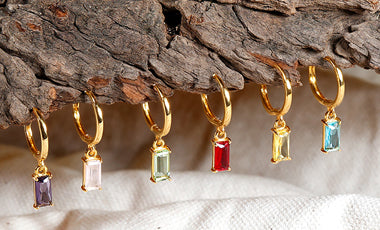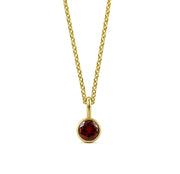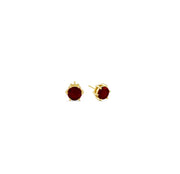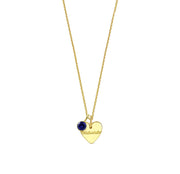If you love gold-plated jewelry, it’s easy to forget to take off your favorite ring or necklace before a shower. It seems harmless, but gold-plated jewelry and water do not mix.
Wearing your bracelet, necklace, or layered chains in the shower, pool, or even during a sweaty workout can dull the finish and shorten its lifespan.
So, can you shower with gold-plated jewelry? The answer is no. In this guide, we’ll explain why water can damage your pieces, how to protect them, and what to do if they get wet.
Can Gold-Plated Jewelry Get Wet?
A little splash while washing hands might not ruin it right away, but regular contact with water from showering, swimming, or cleaning can lead to:
-
Tarnishing and discoloration
-
Fading of the gold layer
-
Rusting of the base metal
-
Loss of shine and smoothness
How Fast Will It Tarnish?
It depends on how often it gets wet and the thickness of the gold layer. Daily water exposure can cause noticeable fading in as little as a few weeks.
Learn More: How Long Does Gold Plated Jewelry Last?
Why Showering with Gold-Plated Jewelry Is a Bad Idea
Think showering with gold-plated jewelry is harmless? Here’s why water, steam, and products in your bathroom can seriously damage its golden shine.
1. Water Wears Down the Plating
Even clean water can slowly erode the thin gold layer, especially hot water, which can open up microscopic cracks in the metal.
2. Soaps and Shampoos Speed Up the Damage
Shower products contain harsh ingredients that strip oils, dirt and unfortunately, your jewelry’s gold layer too. Ingredients like sulfates and acids can discolor or dull the finish.
3. Steam and Heat Cause Moisture Buildup
Even if you’re not under direct water, the steam from a hot shower creates moisture that seeps into your jewelry, especially around small crevices or clasps.
4. Exposure to Chemicals Triggers Oxidation
Chemicals in soaps, body wash, hair dye, or bath salts react with the base metals underneath the gold layer, causing oxidation. This might show up as black spots or green stains on your skin.
Is Gold-Plated Jewelry Waterproof?
No, it is not waterproof. Gold-plated jewelry is water-sensitive and should be treated with care. It is designed for occasional use not for all-day, all-conditions wear.
Waterproof jewelry usually consists of solid gold, stainless steel, silicone, or plastic all of which are much more resistant to moisture.
What About Swimming with Gold-Plated Jewelry?
Swimming is even worse than showering for gold-plated jewelry.
Here’s why:
-
Chlorine in pools strips away gold quickly
-
Saltwater corrodes both the gold layer and base metal
-
Sunscreen and sweat can also leave residues that are hard to clean
If you're headed to the beach or pool, always take your jewelry off and store it in a safe, dry place.
Can You Wear Gold-Plated Jewelry While Working Out?
Technically yes, but it’s not recommended. Sweat contains salt and acids that can wear down gold plating just like water can.
It’s best to remove your jewelry before:
-
Running or gym workouts
-
Hot yoga
-
Outdoor sports
Sweat acts like a chemical on your skin that, combined with body heat and friction, breaks down the gold layer.
How to Protect Gold-Plated Jewelry from Water
Want your gold-plated jewelry to stay shiny and last longer? Follow these simple tips to protect it from water damage and everyday wear.
1. Remove Before Any Water Activity
-
Shower
-
Swim
-
Steam room
-
Dishes/laundry
-
Even washing your hands frequently
2. Dry It Immediately If It Gets Wet
Use a soft towel to pat it dry. Don’t rub aggressively or use heat to dry it.
3. Store in a Dry, Airtight Box
-
Use a jewelry box or zip-lock bag with silica gel packs
-
Keep away from humidity, bathrooms, and kitchens
4. Avoid Chemical Exposure
-
Apply lotions, perfume, and sunscreen before wearing jewelry
-
Don’t spray directly on your pieces
5. Clean with a Soft, Dry Cloth Only
Avoid water or jewelry cleaning liquids. Instead, use a microfiber or cotton cloth to gently wipe away oils and dirt.
What to Do If Your Jewelry Already Got Wet?
Accidentally got your gold-plated jewelry wet? Don’t panic, there's still a chance to save its shine with quick care and the right steps.
Step 1: Gently Dry It
Use a soft towel to pat it dry immediately, no blow dryers or hot air!
Step 2: Wipe Off Residue
Use a clean cloth to remove soap or mineral buildup. Avoid water-based cleaners.
Step 3: Store in a Cool, Dry Spot
Keeping it dry helps stop further damage or tarnish.
Step 4: Monitor for Fading
If it starts looking dull or discolored, consider replating it. Many jewelers offer this service.
Explore More: How to Clean & Restore Gold-Plated Jewelry
Can You Replate Gold-Plated Jewelry?
If the gold layer on your jewelry has worn off completely, a jeweler can professionally replate it. Replating restores the finish and brings back the original shine, making your piece look almost new.
While replating has a cost, it is usually far less than buying a replacement for a favorite piece. This makes it a practical way to extend the life of your gold-plated jewelry.
Conclusion
Gold-plated jewelry adds style and affordability to any outfit, but it is delicate. The most important step to protect your pieces is keeping them dry.
Water, sweat, steam, lotions, and perfume can slowly wear away the gold layer. Handle your gold-plated jewelry with care, clean it gently, and store it properly to maintain its shine for months or even years.
Remember, gold-plated pieces are not meant for constant wear. Remove them when bathing, swimming, or exercising, and your favorite jewelry will stay beautiful much longer.

